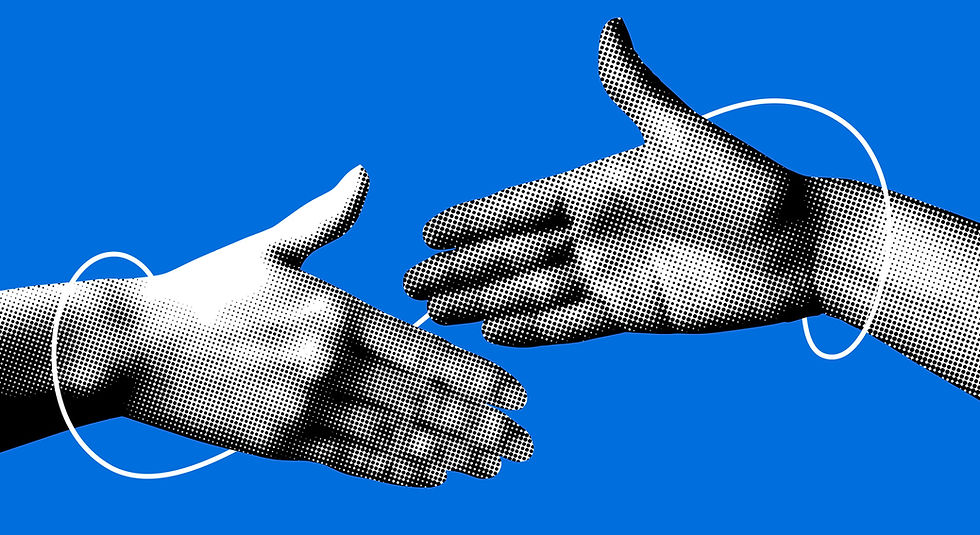What Happened to Manners?
- Brooke Lighton

- Jan 6
- 6 min read
A Look at the Effects of Incivility in the Workplace — and How Leaders Should Help

Loss of manners shows up in our jobs, our driving habits, and in the many ways we take out aggression on others. Ever see bike riders who overwhelm one entire side of a busy main road? Do they move over for cars piling up behind them? Hell no! And now we’ve got young kids on motorized bikes doing wheelies in the middle of the street, some going as fast as 30 mph – without helmets.
In the workplace, incivility has become the norm for many. It manifests in unanswered customer emails, gossip, and lack of support during idea sharing among team members. According to a piece from Harvard University, examples of workplace incivility also include:
Answering questions in a curt manner.
Making a sarcastic or negative face in response to a colleague’s remark.
Not acknowledging the ideas of others.
Taking credit for other people’s work.
Micromanaging colleagues and not giving credit when and to whom it is due.
Increasingly, the relationship between civility and psychological safety are being investigated. But what is psychological safety, and how is it related to civility — and incivility — in the workplace?
The effect of incivility on psychological safety
Coined by Harvard researcher Amy Edmonson in 1999, psychological safety means feeling safe to take interpersonal risks, to speak up, to disagree openly, to surface concerns without fear of negative repercussions or pressure to sugarcoat bad news. This idea is relevant to any situation — whether that be work, school, or even at home. Psychological safety nurtures an environment where people feel encouraged to share creative ideas without fear of personal judgment or stepping on toes.
Employees in organizations characterized by a strong sense of civility tend to experience psychological safety and, therefore, produce higher quality work. As Edmonson explains, “In a psychologically safe workplace, people are not hindered by interpersonal fear. They feel willing and able to take the inherent interpersonal risks of candor. They fear holding back their full participation more than they fear sharing a potentially sensitive, threatening, or wrong idea. When people have psychological safety at work, they feel comfortable sharing concerns and mistakes without fear of embarrassment or retribution. They are confident that they can speak up and won't be humiliated, ignored, or blamed. They know they can ask questions when they are unsure about something. They tend to trust and respect their colleagues.”
If there is a lack of psychological safety throughout our culture it is, without a doubt, finding its way into the workplace. According to McKinsey, “social scientists now believe that psychological safety is one of these basic needs, a prerequisite for people to be at their best in all aspects of life, including home, school, and work.”
The question is, what is the lack of psychological safety costing business?
On a personal note, I once worked at a midsized agency where the owner cheated his employees out of pay, not to mention dolling out verbal abuse. As a contract employee, I was scheduled to receive a paycheck twice a month. Inevitably I’d hear excuses like “Oh, I’ll need to pay you next week; the clients are all slow to pay their bills.” His behavior extended to the entire staff. We knew he was spending money when he showed up with a brand new Mercedes. Needless to say, the bullying didn’t stop there. People left on a weekly basis, some in tears. Once the clients got wind of the culture, they headed for the door as well.
As with my aforementioned experience, workplace civility is critical to every aspect of a successful business — including the bottom line.
How lack of civility is affecting business
According to the Harvard Business Review (HBR), research shows that a little civility goes a long way in improving performance. Here’s a recap of one example:
One experiment showed that psychological safety was 35% higher when people were offered a suggestion civilly, rather than uncivilly (i.e., an interaction marked by inconsiderate interruption). Other research has shown that psychological safety improves general team performance. A study of more than 180 Google teams found that who was on the team mattered less than how team members interacted, cooperated in their assignments, and viewed member contributions. Those on teams with more psychological safety were more likely to make use of their teammates’ ideas and less likely to leave Google.
The findings in the HBR piece are revealing:
Civility improves teams’ functionality by helping employees feel safer.
In a study of more than 20,000 employees, those who felt respected by their leader reported 92% greater focus and 55% better engagement.
You cannot simply impose civility: employers need to engage staff in an “ongoing conversation defining precisely what civility means.”
Granted, there are performance gains to be made when civility rules the workplace. But, on the downside, the financial threats of an uncivil culture are worth considering.
The actual costs of incivility
Again, the Harvard Business Review weighs in with a piece entitled “The Price of Incivility.” Through a poll of 800 managers and employees in 17 industries, you begin to see just how people’s reactions play out. Among workers who’ve been on the receiving end of incivility:
48% decreased their work effort.
47% intentionally decreased time spent at work.
38% intentionally decreased the quality of their work.
80% lost time worrying about the incident.
63% lost work time avoiding the offender.
66% said that their performance declined.
78% said that their commitment to the organization declined.
12% said that they left their job because of the uncivil treatment.
25% admitted to taking their frustrations out on customers — often in the form of unanswered emails.
In addition to the above, companies pay a price as creativity suffers. A study at the University of Florida, highlighted in the aforementioned HBR piece, found that participants who were treated rudely by other subjects were 30% less creative than those who were treated with civility. In fact, they produced 25% fewer ideas.
What’s the price for incivility in the workplace? Managers at Fortune 1,000 firms spend about seven weeks a year cleaning up the aftermath of incivility.
But as a leader, what can you do to improve work culture?
7 ways to address workplace incivility
According to Vantage Circle, here are 7 tips leaders can use to improve work culture:
Create a civility model: Develop policies and codes of conduct. This can include rules like no loud tones, no rude comments, no door slamming. By praising those whose conduct is positive, you can reinforce the good attitudes you experience from all colleagues.
Screen prospective hires: Look at how candidates handle themselves at all touchpoints. Are they good listeners? Or, are they all about “me?” Test them; behavioral tests can reveal a lot. And talk with their references.
Do some research on your company culture: When you detect incivility, share its impacts, and recommend creating a code of conduct if one does not exist.
Avoid accepting excuses, such as:
“We all experience it. Welcome to the club”
“That’s just the way he is.”
“It’s nothing. Ignore it.”
“She’s the boss. You have to put up with her.”
“I’d stay quiet if I were you.”
Don’t forget: you are entitled to civility. Having to experience abuse steals your trust, negatively affects work output, and hurts the company morally and financially. It is the job of senior management and team leaders to create a healthy culture.
Address disrespectful behavior quickly: Hold those in question accountable. If not, you can expect more of the same.
Get feedback from employees: A healthy work environment is one where employees are not afraid to raise concerns. Just make sure it has boundaries so that you’re not creating a culture of tattletales; that’s not healthy either.
Consider the big picture: Politics, social issues, and violence in our culture can cause much discussion and stress in the workplace. As an employer, your job is to avoid these external factors. If you don’t have one, set up an Employee Assistance Program for those who are suffering from anxiety due to outside issues.
Rather than ignoring uncivilized behavior and suffering the results, setting up codes of conduct and administering consequences for continued incivility can serve to mitigate bad outcomes for workers, leaders, and keep your business on a growth path.
As one leading source puts it, “In a civil workplace, employees are less likely to experience stress, anxiety, and burnout. They are more likely to feel supported by their colleagues and leaders, which can enhance their overall job satisfaction and wellbeing.”



Comentarios